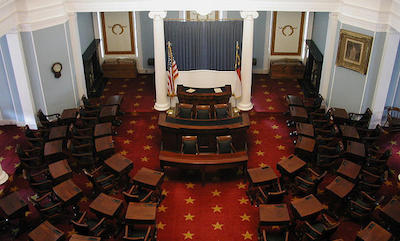Professor: ‘Let’s Focus on Real Threats to Health and Well-Being’.

On March 23, North Carolina governor Pat McCrory signed into a law a bill now known as HB2, which revoked all local gay and transgender nondiscrimination ordinances in the state.
The law specifically targets transgender North Carolinians by barring them from bathrooms and changing facilities matching their gender, instead requiring all individuals to use bathrooms and changing facilities matching the sex listed on their birth certificate.
This is one of a number of so-called “bathroom bills” cropping up around the country: The governor of South Dakota recently vetoed a bill restricting transgender students’ use of all gender-specific facilities in public schools, while a similar bill died in committee in the Tennessee legislature. Nine other states—including Massachusetts—have bills in the works.
HB2 has quickly drawn outrage and protests, including from a large and growing number of major businesses. On March 28, the American Civil Liberties Union (ACLU) filed a lawsuit against HB2, arguing that the bill violates several federal laws.
Sophie Godley, clinical assistant professor of community health sciences, spoke about the North Carolina law, which she says harms a population already at increased vulnerability to negative health outcomes—and distracts from the real threats to health faced by North Carolinians.
What is your reaction to the new North Carolina law and other laws barring LGBTQ anti-discrimination currently being proposed around the country?
I’m both dismayed and disgusted by the content of this law and the manner in which it was shoved through the political process. By all accounts the legislative process was rushed intentionally, so much so that some North Carolina legislators had not even seen the bill before it was brought up for a vote.
The content of the bill is extreme—creating a second-class citizenship for LGBTQ residents of the state, and restricting local authorities from introducing or enforcing protections for residents. The idea that in 2016 an entire state could intentionally reduce protection for a vulnerable population is outrageous. Further, the bill explicitly singles out our transgender community, effectively denying them a basic human right—the right to use a bathroom.
How do you see this impacting public health?
LGBTQ individuals are vulnerable to negative health outcomes. The links between discrimination and health have been well-established.
Further, this bill specifically plays on fears and myths about the transgender community. That a state government would take the time to reinforce debunked myths about a community when our world is filled with real, substantial problems is mind-boggling. I’d like to encourage the North Carolina state legislature to focus on some of the real threats to health and well-being for residents—there’s a lot of work to be done in the state.
Do you see these pieces of legislation as part of a larger issue?
Cities have long created safety for the LGBTQ community, and provided sanctuary for those often excluded from the larger political process. I’m encouraged by the near-immediate public backlash, particularly from corporations and businesses, who are perhaps going to play a role in reversing this egregious law.
Faced with legislation like this, what should the role of public health professionals be?
We in public health have a responsibility to our transgender friends, family, and loved ones to speak out against hurtful, repulsive, blatant transphobia like that on display here. The idea that someone could be prevented from accessing a basic human right, a bathroom, in 2016 is, in my opinion, immoral. That the discourse is about protecting vulnerable children from supposed harm—when there is absolutely zero evidence of such a threat—is disingenuous at best. It’s a distraction from the real work of reducing violence and sexual assault in our communities.
One quick last point I’d like to make: I’m profoundly grateful for the trans folks in my life, and I’m in awe of their ability to meet challenges that threaten their well-being every day. But it shouldn’t be hard to be one’s true, authentic self. We can, and we should, do better.